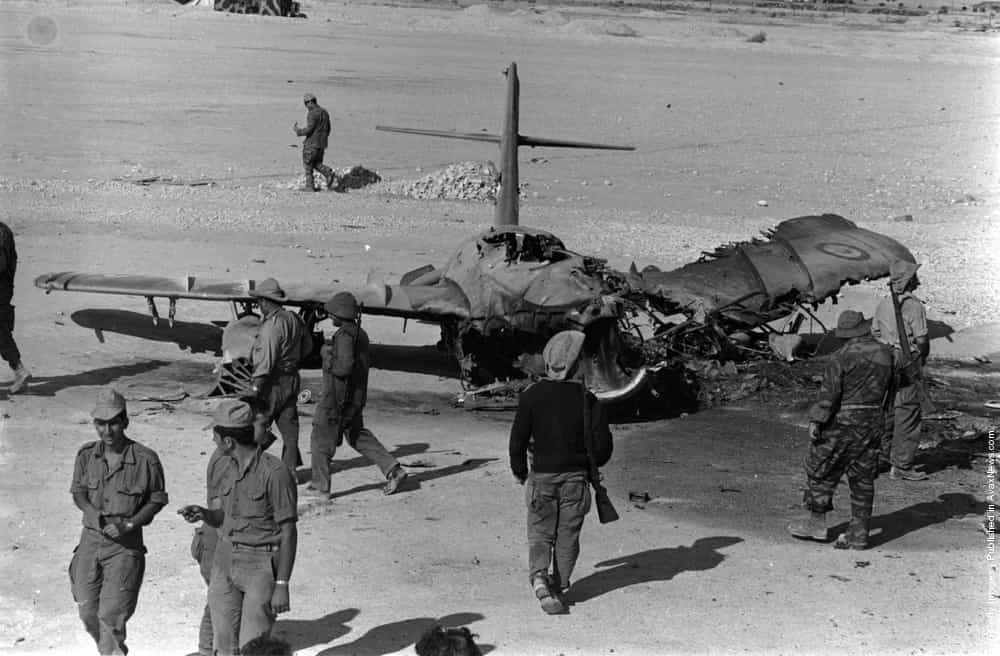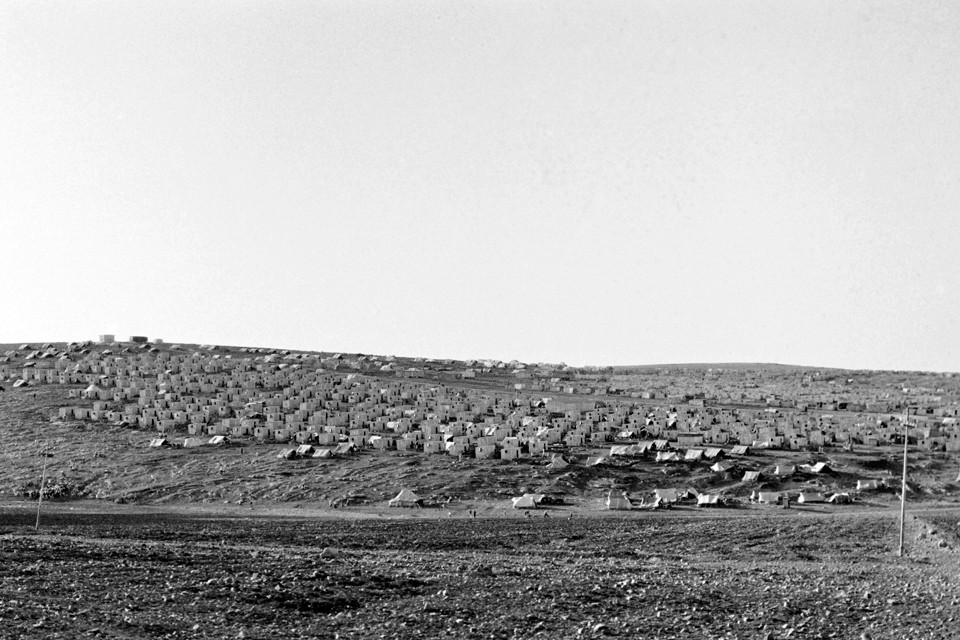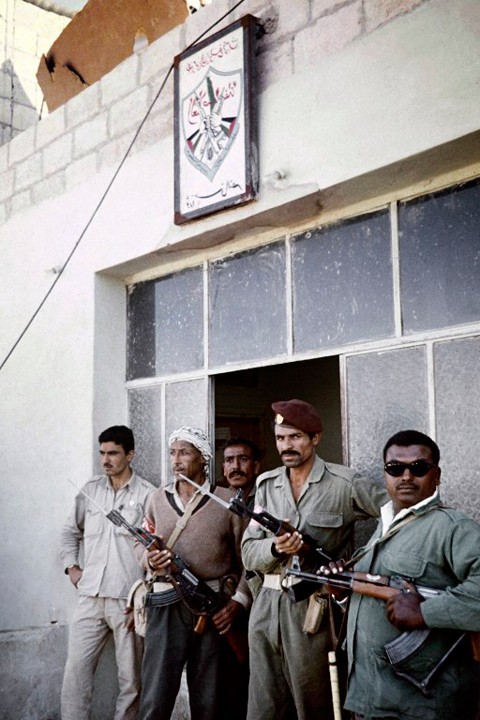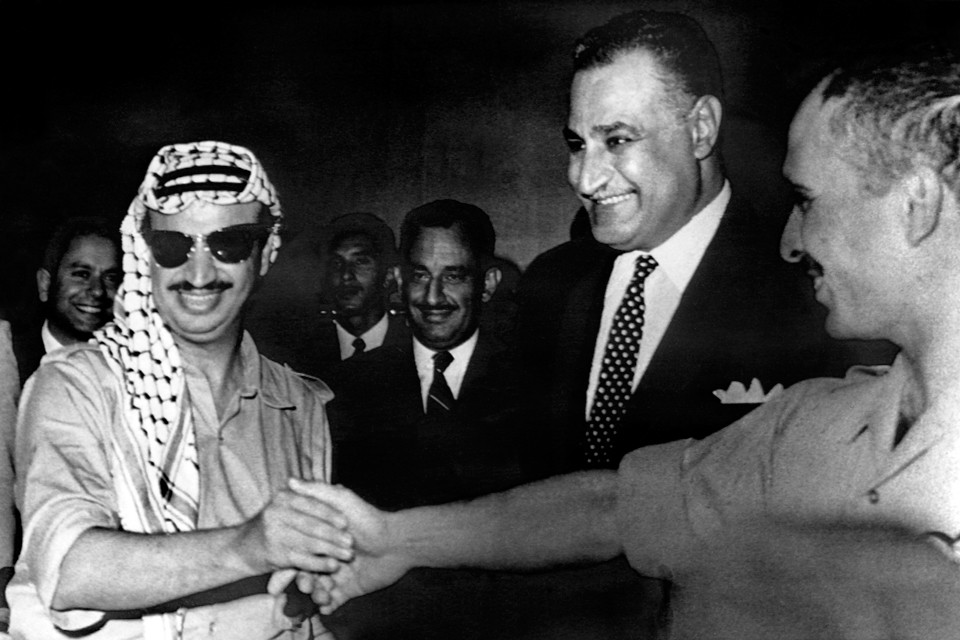5TH ANNIVERSARY OF VICTORY IN THE SIX-DAY WAR
Lital Woolf, Tel Aviv, 5 June 1972
Today marks the fifth anniversary of the beginning of the Six-Day War - the conflict which saw the decisive defeat of the Arab invasion forces, returned Jerusalem into the hands of Israel, and secured our national borders, all in the space of under a week, and while Israel was outnumbered more than 5:1 in infantry, 4:1 in combat aircraft and 2.5:1 in tanks and armoured vehicles. Other than reports of informal gatherings, dinners and parties being planned among some off-duty members of the Defence Force and veterans from the conflict, however, reaction has been muted, and business has continued as usual throughout the Land of Israel. Today, however, Haaretz wishes to pay homage to those who kept us safe from aggression through their courage and skill, by discussing the two most prominent branches of the Defence Force: The Armoured Corps and the Air Force, who, between them, played the largest role in defending our nation and secured victory.
 Israeli tankers mount their Sho't main battle tanks during the call to arms.
Israeli tankers mount their Sho't main battle tanks during the call to arms.
The supremacy of the tank in desert warfare was a lesson learned in the Western Desert campaigns of the Second World War, by the veterans who would later become the Jewish Brigade in the British Army. In the Israel Defence Forces, there is a saying: "האדם שבטנק ינצח" ("The man in the tank wins.") This was never more true than in the Six-Day War, where this adage was proven so decisively that it was adopted as the motto of the Israeli Armoured Corps. While the Arab forces deployed many of their tanks and armoured vehicles spread-out, in support of their infantry and to boost their morale, the Defence Force organised its entire tank force into nine armoured brigades. Despite being heavily outnumbered overall, these tank brigades were able to concentrate their firepower in a small area, destroying or routing one Arab unit after another in brief, rapid battles - a classic example of force concentration and the
schwerpunkt doctrine. With their protecting tanks destroyed, and the Arab lines penetrated in multiple locations, the result was a disaster, with the air battle of the previous day meaning that the invasion forces had no alternative but to rout back to their own territories.
 A Vautour strike aircraft passing over an Armoured Corps tank column on its way to provide close air support against Egyptian armour.
A Vautour strike aircraft passing over an Armoured Corps tank column on its way to provide close air support against Egyptian armour.
The result on the ground was not only due to tactical doctrine, but in the wider doctrinal and structural differences between the Israeli and Arab forces. The Israel Defence Forces' reserve system, in which every citizen is expected to serve equally and be available for the defence of the country, allows for the raising of a large force when attacked, but a demobilisation and a return to civilian life in peacetime, allows for the creation of a professional, merit-based officer corps, and an army in which every man and woman knows that he or she is fighting for his nation and his family's security and survival. By strongly keeping a policy of "no-one left behind", a powerful bond of
espirit de corps is proudly shared, and individual initiative and courage are not only permitted, but expected.
 An Egyptian tank crewman lies dead near his destroyed T-34/85 medium tank, at Um-Katef. Many thousands of unfortunate Arab conscripts suffered the same fate, forced to lay down their lives for the ideological objectives of distant dictators.
An Egyptian tank crewman lies dead near his destroyed T-34/85 medium tank, at Um-Katef. Many thousands of unfortunate Arab conscripts suffered the same fate, forced to lay down their lives for the ideological objectives of distant dictators.
Arab forces relied - and continue to rely - upon a mass standing army of conscripts, often poorly-educated and partly illiterate, as those who served in the rank-and-file were those who lacked the money or influence to bribe their way out of military service. The officer corps, by contrast, are largely selected on the basis of their political loyalty to the leadership and ideological purity to the cause of pan-Arabism, with social and wealth requirements to be commissioned. Such a military doctrine was suited to the mass combat of the First World War, but is utterly inadequate in the face of modern maneuver warfare. Indeed, such was the contempt for the common Arab soldier and his sacrifice among the Arab leadership that President Nasser is even rumoured to have ordered the Republican Guard to fire upon retreating Egyptian soldiers, to prevent them spreading the news of the catastrophic defeat of the assembling invasion force in the Sinai.
 A flight of Shahak interceptors on patrol over Galilee during the war. Such was the military threat to Israel that only a single squadron could be retained to intercept Arab air attacks against the civilian population.
A flight of Shahak interceptors on patrol over Galilee during the war. Such was the military threat to Israel that only a single squadron could be retained to intercept Arab air attacks against the civilian population.
Meanwhile, the actions of the Air Force in 'Operation Moked' are so legendary across the globe that they do not even require a great degree of description. In response to the invasion preparations, the Israeli Air Force - severely outnumbered - was able to launch three air raids in a single day, in extremely quick turnaround, with each aircraft being fully refuelled and re-armed in an average of seven and a half minutes from landing to returning to the air. In the first wave launched at 7:45 am, 11 airfields were attacked by 183 Israeli aircraft, during which 197 Egyptian aircraft and 8 radar stations were destroyed. During the second wave, launched at 9:30 am, 16 airfields were attacked and 107 Egyptian aircraft were destroyed; while two Syrian fighters that had managed to get into the air were destroyed in aerial combat. By the time the third wave lifted off at 12.15pm, the Egyptian Air Force had effectively ceased to exist, and the strikes moved to the near-complete neutralisation of the Syrian and Jordanian air forces. In total, 452 Arab aircraft were destroyed, for the loss of 46 aircraft and 24 pilots from the Israeli Air Force - a success ratio of nearly ten to one, while facing numerical odds of more than four to one against. This allowed the Air Force to devote its full attention to the support of the Armoured Corps, destroying the Arab armoured divisions and blunting their attack through close air support and logistical strikes, closely interoperating between branches.
 A destroyed Soviet-made MiG-15 fighter of the Egyptian Air Force.
A destroyed Soviet-made MiG-15 fighter of the Egyptian Air Force.
Overall, there is no reason to believe that the close co-operation between the Armoured Corps and the Air Force, each with their own brand of valour and martial skill, will not continue bringing victory in battle and keep our nation safe from attack in the future. As Yitzhak Rabin said of the war: "Our airmen, who struck the enemies' planes so accurately that no one in the world understands how it was done and people seek technological explanations or secret weapons; our armoured troops who beat the enemy even when their equipment was inferior to his; our soldiers in all other branches, who overcame our enemies everywhere, despite the latter's superior numbers and fortifications - all these revealed not only coolness and courage in the battle but an understanding that only their personal stand against the greatest dangers would achieve victory for their country and for their families, and that if victory was not theirs the alternative was annihilation." This was the true test of not only our military doctrine and tactics, but of the courage of our citizens-in-arms, and since the war, all the world now knows that Israel lacks neither.












